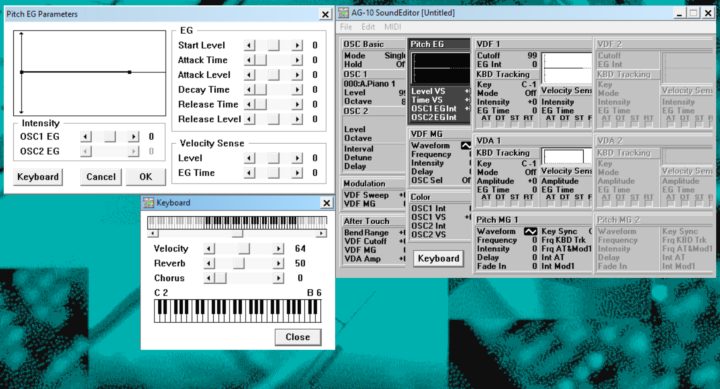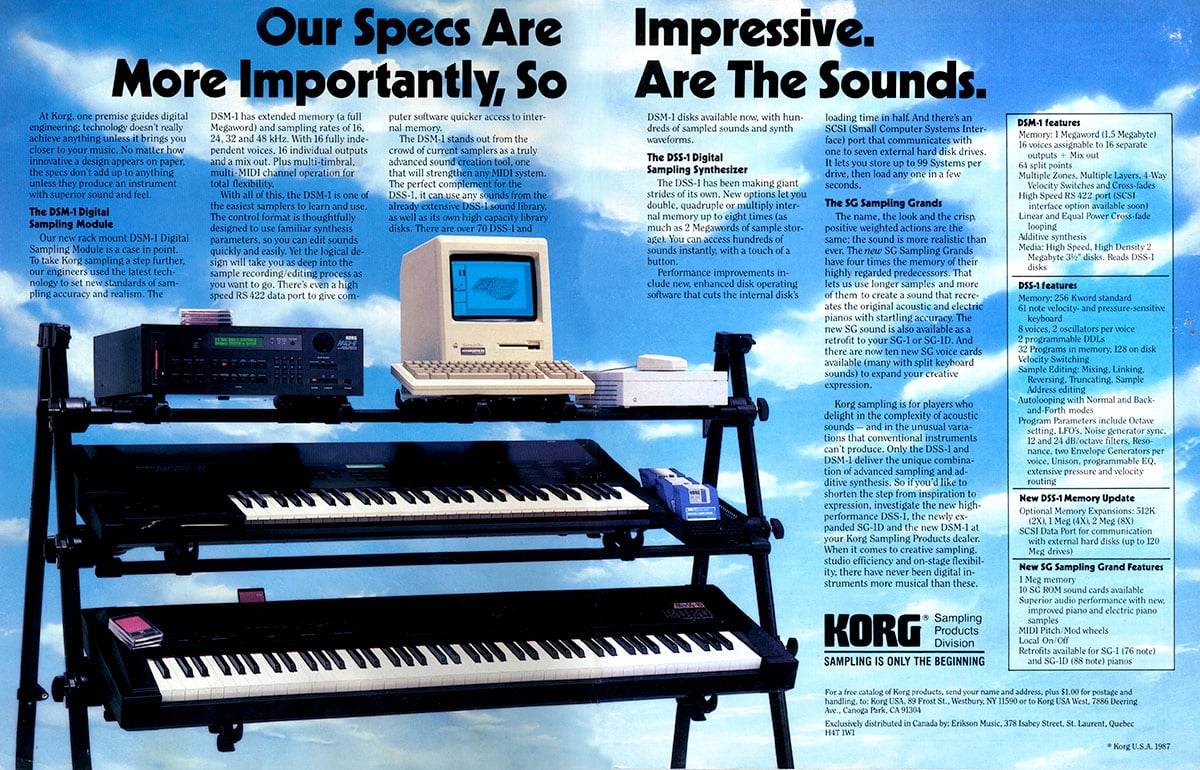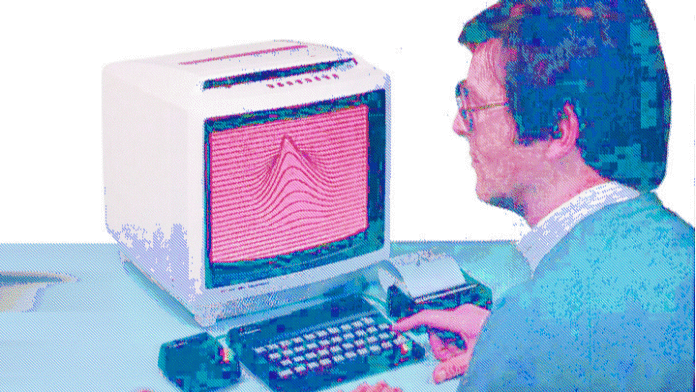I’m a fairly vocal advocate about the joys of vintage computing in music; a nostalgia filled process that often leads to unique results. Make no mistake though; there’s a fair amount of frustrating, hair-pulling „gotcha’s“ assorted with the pastime. Obsolete media, picky display requirements, bespoke connectors, regional incompatibilities, plus battery or capacitor leakage to name a few!
Despite a multitude of challenges, it turns out I’m not the only one into this stuff! I asked a number of folks for their views, hearing a multitude of reasons for keeping old machines running.
We begin with a great point from Youtuber & Musician Architecture, that of integration with older hardware:
„Old computers are the perfect compliment to old hardware. Most of these older computers had software that supported these hardware synthesizers and samplers on a deeper level than what is commonly available today. This is what inspired me to create my show This Old DAW. Atari ST and Classic Macs have been my favorite go-to machines for this purpose (would love to get more into Amiga someday). Between the option of MIDI editors that integrate into your DAW, Sampler editors (SCSI transfers specifically), these machines were designed to work with each other where as modern machines and DAWs treat hardware support like it’s an afterthought. Some may have concerns about the fragility of vintage systems. I’m focused on servicing all of my vintage units to last 10-20 more years.“ – Architecture
It’s true, if you’re making ye-olde computer music, you likely have a few bits of ye-olde hardware: sound modules, samplers, FX etc, each with it’s own vintage editing software!
„I work mostly with hardware, so I find old software deals with hardware better, MIDI timing is more stable and with less jitter.“ – 18 Slashes
„(It) works better with some hardware I have (Emulator II & 3, looking at you)“ – TheButtonMashers
It’s about multiple types of connection though; it’s as much about our cerebral & emotional connection to these (limited) tools as it is SCSI or MIDI, or floppy disks:
„A Certain type of workflow. Modern DAWs create a false illusion that you can control everything but the reality is that limitations help with creativity. Tweaking EQ on the snare for hours won’t make your tune from bad to great. A lot of music from that era might not sound up to the modern standards, often samples don’t even loop properly, but that all adds to the vibe“ – Nkrypth
„Nostalgia, familiar tools, limitations spark creativity sometimes, that 8bit 22kHz sound…“ – DjLilis
„For me, it’s limitations sparking creativity.“ – Darren Landrum
„(There’s) no subscriptions, this is becoming the blight of the modern world. The lack of modern internet support makes it easier to focus and have less distraction. Also, the UI of older DAWs I find aesthetically pleasing, for getting my mind into the 90s/Y2K mindset I’m trying to achieve. My desire to understand on a deep level of how many of my favorite productions were made, and the limitations and issues they faced helps me to better connect and understand the perspective of my favorite artists.“ – Architecture
„I am already familiar with the systems and their interfaces so I’m faster at working out of older DAWs, (Plus a) lack of enshittification: No subscriptions, no online authorizations, no 1000 online installers and plugin managers.“ – 18 Slashes
Ah, subscriptions! Just like film buffs or music lovers, many software users like to purchase and own their musical tools. Subscription models don’t tend to offer this permanence. In other spheres, like entertainment or gaming, I’ve actively lost content that I paid for, due to the abandonment of a platform, or a compatibility-breaking update.
„I just like using stuff without any online activation. Copy protection is ok though. Just look at the whole Reason situation. Not possible to sell / use older Reason versions anymore because they shut down their activation services (which provides a key for the specific computer). What about plugins from 2001 to ~2016? Probably not usable anymore because of online activation and shutdown online services. You don’t really own the stuff anymore – you buy a temporary license (even if they say it’s a lifetime – in reality it’s not). They want you to buy new stuff. Makes sense, software developers want to keep their jobs lol. I payed 100 bucks for the Cubase VST 3.7 update back then (I believe), I received the CD-ROM via mail. Good times.“ – James Dean 720
„The software doesn’t annoy me to connect to the internet, update, or cloud save – (plus) no ads in the software. I know my files are here not on the cloud.“ – TheButtonMashers
„I’ll just chime in with +1 for stability and simplicity. Less features and options yield less bloat (and less to go wrong). I’d also mention that some older computer hardware is much easier to upgrade or repair yourself, so long as parts are available…“ – Nuform
Of course, lets not forget the draw of nostalgia in all of this. At 14, a heavily-bullied child – the Amiga in my bedroom became my refuge – today, diving into that 1993 operating system still makes me feel more at ease – priceless.
„I do enjoy some aesthetics like the unique designs, and floppy disks. Particular faves of mine are the apple all in ones, IBM PS line, and the apple transparent iMac and iBooks.“ – TheButtonMashers
Finally, we have my favourite response for this article, which touches on the universal themes of disability, confidence and essentially, making up for lost time.
„So in my case, nostalgia is definitely foundational but my circumstances have also changed. I grew up with that machine (an Amiga A600), continuously inspired by people making amazing art or music with it, always wanting to create my own and wishing I was less lazy and unmotivated. This frustration of not being able to actually **do** something, *anything*, was a recurring theme of my life, one that became so much of a handicap that I sought help — guess what, I was diagnosed with pretty serious executive dysfunction / ADHD and recently started receiving treatment for it.
So here I am, finally starting to catch up on desires that started in my teenage years and have since only become stronger.
Because when you grow up with executive dysfunction, there is nothing that makes you forget about your dreams, on the contrary they mature in you, they keep nagging you in such a way that you seek them out in a perverse, continuous self-torture: I’ve been listening to tons of tracker music, watching hours upon hours of YouTube vids, I have stood at the very edge of the demoscene and *almost* reached out to enthusiast communities so many times.
Now that I feel capable, I want to prove to myself I can actually… do it.“ – Faelnor
We wish Faelnor the best of luck in their new musical journey. If you’d like more old computer action, then please check out this video by Architecture, and see you next time!
Posted by MagicalSynthAdventure an expert in synthesis technology from last Century and Amiga enthusiast.
Liam Howlett’s humble selection on latest tour
Roland MC-101
Mysterious IXA Sound Source
With Charlie Clouser, Richard Nicol and Paulee Bow
Legendary brand added to PWM’s stable
Om Unit on the enduring influence of the TB-303
Copyright Sonic State Ltd © 1995-2025. All rights reserved.
Reproduction in whole or in part in any form or medium without express written permission from Sonic State is prohibited.
